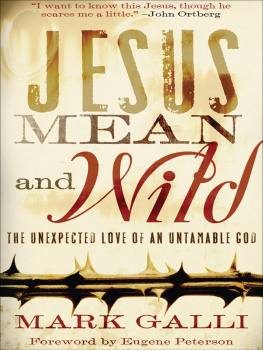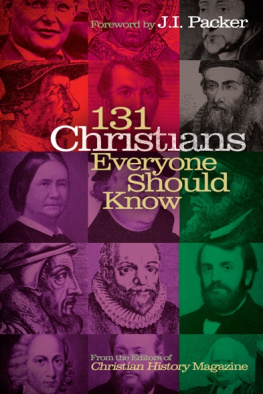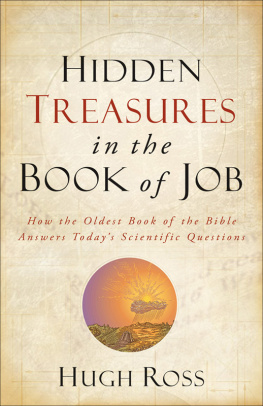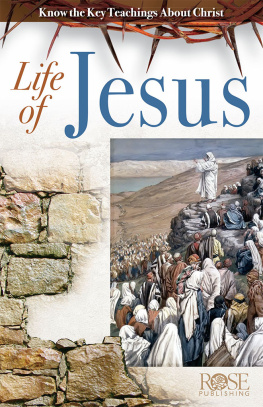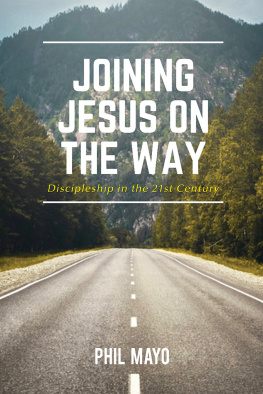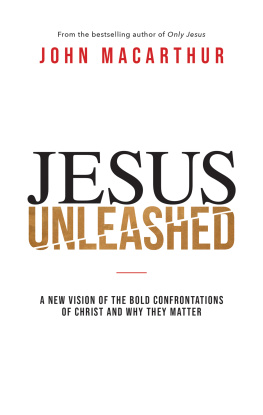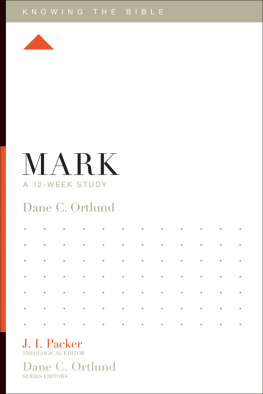JESUS
Mean
and Wild
JESUS
Mean
and Wild
THE UNEXPECTED LOVE OF AN UNTAMABLE GOD
MARK GALLI

2006 by Mark Galli
Published by Baker Books
a division of Baker Publishing Group
P.O. Box 6287, Grand Rapids, MI 49516-6287
Printed in the United States of America
All rights reserved. No part of this publication may be reproduced, stored in a retrieval system, or transmitted in any form or by any meansfor example, electronic, photocopy, recordingwithout the prior written permission of the publisher. The only exception is brief quotations in printed reviews.
Library of Congress Cataloging-in-Publication Data
Galli, Mark.
Jesus mean and wild : the unexpected love of an untamable God / Mark Galli.
p. cm.
Includes bibliographical references.
ISBN 10: 0-8010-1284-8 (cloth)
ISBN 978-0-8010-1284-6 (cloth)
1. Jesus ChristCharacterMeditations. 2. Bible. N.T. Mark
Meditations. 3. Christian lifeMeditations. I. Title.
BT304.G25 2006
232.903dc22 2005037117
0-8010-6770-7 (intl. pbk.)
978-0-8010-6770-9 (intl. pbk.)
Unless otherwise indicated, Scripture is taken from the New Revised Standard Version of the Bible, copyright 1989, Division of Christian Education of the National Council of the Churches of Christ in the United States of America. Used by permission. All rights reserved.
Scripture marked ESV is taken from The Holy Bible, English Standard Version, copyright 2001 by Crossway Bibles, a division of Good News Publishers. Used by permission. All rights reserved.
Scripture marked NIV is taken from the HOLY BIBLE, NEW INTERNATIONAL VERSION. NIV. Copyright 1973, 1978, 1984 by International Bible Society. Used by permission of Zondervan. All rights reserved.
Italics in biblical quotations indicate emphasis added by the author.
To Luke, Katie, and Theresa, who follow the mean and wild and merciful Jesus, each in their own delightfully unique way.
CONTENTS
I cant handle this angry, vindictive God of the Old Testament, smoke pouring out of his nostrils, coals of fire spitting from his mouth. How can you expect me to go along with such barbaric primitivism? No thanks. Ill stick with Jesus. Jesus who loves the little children, all the children of the world and never raises his voice. You can have all that Old Testament yelling and stomping as far as Im concerned. Im a New Testament person. Im a Jesus Christian.
How many times have you heard or even thought words like these? Maybe even said them yourself?
Not long after the Christian church was formed, men and women began talking like this. They loved Jesus but were embarrassedscandalized is more like itby his family. So they set about to rescue him from his heritage. They did it by the simple expedient of getting rid of it, denying that Jesus had anything to do with the God who incinerated Sodom and Gomorrah, or who established murderous, adulterous David as an ancestor of Messiah. Jesus was wonderful but he was in an entirely different class from the crude Semitic deity who created snakes and mosquitoes and terrified little children with threats of fire and brimstone.
The man who led this campaign for a nice Jesus understood Jesus as absolutely unique. He was the Savior who made all things new. In order to comprehend this uniqueness it was necessary to clear the deck of all things old. High on the list of all things old was the accumulation of crudities and barbarism that littered the pages of the Old Testamentall that anger and war, sex and superstitionso that Jesus could be seen as pure, uncompromised truth, the light-filled way of salvation, pure and simple. He vigorously waged a publicity campaign to save Jesus from every hint of divine tantrum, supernatural whim and whimsy. He wasnt content to get rid of the Old Testament; the Gospels were thoroughly contaminated by it and so had to be radically purged also. Paul was about all that was left and even he had to be edited.
It looked for a while that he might succeed. He was a powerful and influential pastor and preacher, an ardent champion of Jesus. He attracted quite a following. But then the tide turned against him. The bishop of Sinope, who was his own father, excommunicated him. The Christian community came together in a remarkable consensus and comprehensive affirmation that we cannot edit Jesus to our own convenience. We have to take the revelation as given to us by the Gospel writers, not pick and choose what pleases us, discarding the rest. The church as a whole has not wavered in that conviction.
For all his good intentions, his publicizing and promotion of Jesus as a welcome relief from the embarrassments of his family tree, Marcion (for that is the mans name) now holds the uncontested position as the churchs pioneer heretic, who, in his enthusiasm for Jesus as the magnificent head of all things, tried to get rid of the earthiness of his history and the embarrassment of his family.
The ghost of Marcion is still with us.
In a free-market economy everyone is more or less free to fashion and then market whatever sells: cars, clothing, ideas, self-improvement plans, movies, booksand Jesus. When evangelism is retooled as recruitment, then marketing strategies for making Jesus attractive to a consumer spirituality begin to proliferate. Words or aspects of Jesus that carry unwelcome connotations are suppressed. We emasculate Jesus.
But we must not. Every omitted detail of Jesus, so carefully conveyed to us by the Gospel writers, reduces Jesus. We need the whole Jesus. The complete Jesus. Everything he said. Every detail of what he did.
Mark Galli, using St. Marks Gospel as his text, is insistent that we preserve the holy angularity of Jesus who is alive among us still and wills to save us on his terms, not ours.
Eugene H. Peterson
professor emeritus of spiritual theology
Regent College, Vancouver, BC
As for the communion of saints: It was Dietrich Bonhoeffer, in Cost of Discipleship, who showed me that grace is costly and that it is still grace. The Jesus he painted in that classic suggested to me that Jesus was more intimidating and attractive than I had imagined.
As for theological mentors: Eugene Peterson, in his writings and in conversation, has alerted me with vivid prose and incisive analysis about the dangers of sentimental discipleship and the demands of an ever-merciful Lord.
As for friends: David Neff, editor of Christianity Today, gently prodded me to see the love of God in the meanness of Jesus, and to say what I mean and not just what sounds daring. Ted Olsen, Christianity Today online managing editor, has been a friendly sparring partner in many a theological debate and has sharpened my thinking as a result.
As for publishing colleagues: Bob Hosack, my editor, thankfully was not mean and wild but in fact graciously extended my writing deadline twice, and Paul Brinkerhoff gently worked with me during the editing process.
As for family: Katie has encouraged me not to mince words; she also helped me track down one nearly impossible reference. Theresa has reminded me to live with joy; she was also patient with an often distracted father (but sometimes glad of it, I suspect). Luke has reminded me that actions are as important as words; he has also given me an excuse to take much-needed breaks from writing for fly-fishing trips and golf. My wife, Barbara, has reminded me that I am loved. She was gracious enough to read the entire manuscript and mean enough to suggest significant rewrites here and there. The book is better for her input. But alas, the remaining flaws are my doing.
I once wrote an article for a leading Christian publication and in one part noted how mean Jesus was at times. My seminary-educated editor deleted the paragraphs, and when I asked why, she said I was taking the verses out of context, and it would take too much space to explain that Jesus wasnt really mean. I replied that these were but a sampling of passages where Jesus seemed pretty intimidating. I gave two more examples. She stared at me hard. Then she blinked in seeming irritation as she said, I can explain those too.
Next page
